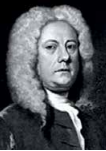This is a great example of how the world changes and with it our better understanding of farming methods.

Jethro Tull (1674– 1741) was an early English agricultural experimentalist whose book The New Horse Hoeing Husbandry: An Essay on the Principles of Tillage and Vegetation was published in 1731. It was the first textbook on the subject and set the standard for soil and crop management for the next century (it is now available online as part of core historical digital archives click the QR Code below). In a way, Tull’s publication was a predecessor to many other books, such as Building soils for better crops by Fred Magdoff and Harold Van Es, as it discussed manure, rotations, roots, weed control, legumes, tillage, ridges, and seeding.
Tull noticed that traditional broadcast sowing methods for cereal crops provided low germination rates and made weed control difficult. He designed a drill with a rotating grooved cylinder (now referred to as a coulter) that directed seeds to a furrow and subsequently covered them to provide good seed-soil contact. Such row seeding also allowed for mechanical cultivation of weeds, hence the title of the book. This was a historically significant invention, as seed drills and planters are now key components of conservation agriculture and building soils. But the concept of growing crops in rows is attributed to the Chinese, who used it as early as the 6th century B.C.E.
Tull believed that intensive tillage was needed not only for good seed-soil contact but also for plant nutrition, which he believed was provided by small soil particles. He grew wheat for thirteen consecutive years without adding manure; he basically accomplished this by mining the soil of nutrients that were released from repeated soil pulverization. He therefore promoted intensive tillage, which we now know has long-term negative consequences. Perhaps this was an important lesson for farmers and agronomists: Practices that may appear beneficial in the short term may turn out detrimental over long time periods. What is important is a complete understanding what you are doing on your farm and measuring all the effects of this, not just the results.
